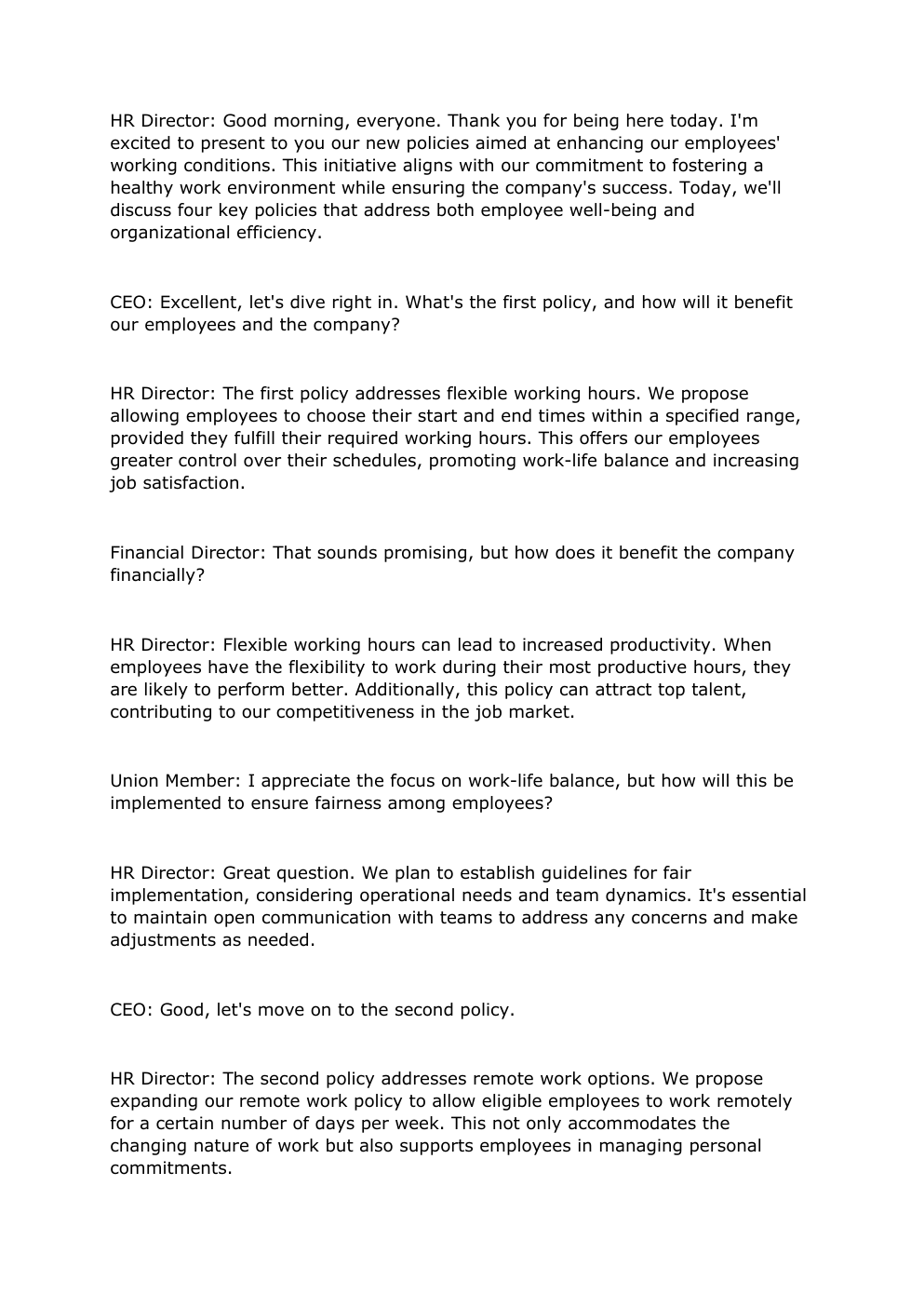conditions at work
Publié le 16/01/2024
Extrait du document
«
HR Director: Good morning, everyone.
Thank you for being here today.
I'm
excited to present to you our new policies aimed at enhancing our employees'
working conditions.
This initiative aligns with our commitment to fostering a
healthy work environment while ensuring the company's success.
Today, we'll
discuss four key policies that address both employee well-being and
organizational efficiency.
CEO: Excellent, let's dive right in.
What's the first policy, and how will it benefit
our employees and the company?
HR Director: The first policy addresses flexible working hours.
We propose
allowing employees to choose their start and end times within a specified range,
provided they fulfill their required working hours.
This offers our employees
greater control over their schedules, promoting work-life balance and increasing
job satisfaction.
Financial Director: That sounds promising, but how does it benefit the company
financially?
HR Director: Flexible working hours can lead to increased productivity.
When
employees have the flexibility to work during their most productive hours, they
are likely to perform better.
Additionally, this policy can attract top talent,
contributing to our competitiveness in the job market.
Union Member: I appreciate the focus on work-life balance, but how will this be
implemented to ensure fairness among employees?
HR Director: Great question.
We plan to establish guidelines for fair
implementation, considering operational needs and team dynamics.
It's essential
to maintain open communication with teams to address any concerns and make
adjustments as needed.
CEO: Good, let's move on to the second policy.
HR Director: The second policy addresses remote work options.
We propose
expanding our remote work policy to allow eligible employees to work remotely
for a certain number of days per week.
This not only accommodates the
changing nature of work but also supports employees in managing personal
commitments.
Financial Director: Remote work can save costs on office space, but are there
other financial advantages?
HR Director: Indeed.
By allowing remote work, we can reduce overhead costs
associated with office space and utilities.
This policy can contribute to cost
savings while maintaining or even improving employee productivity.
Financial Director: Although remote work can reduce office-related costs, we
should invest in robust cybersecurity measures to protect sensitive financial data
and evaluate the feasibility of providing remote employees with necessary
equipment and technology to ensure seamless operations.
Union Member: Remote work sounds good, but not all roles can be done
remotely.
How will this be fair to employees in different departments?
HR Director: Absolutely, and that's why this policy will be rolled out selectively,
considering the nature of each role.
Departments will collaborate to determine
eligibility criteria, ensuring fairness across the organization.
Union member: I think that the eligibility criteria for remote work should be
transparent, and the union should be consulted to ensure it doesn't
disproportionately affect certain groups of employees.
This policy must Consider
incorporating feedback from the union to address any potential challenges
related to employee representation and collective bargaining during remote work
arrangements.
CEO: SO, The second policy proposes expanding remote work for eligible
employees, emphasizing flexibility and personal commitment support.
Now, let's
proceed to the third policy.
Union Member: The third policy centers on compressed workweeks, suggesting
that employees can compress their standard work hours into fewer days,
allowing for a four-day workweek.
This aims to provide employees with an
extended weekend, fostering well-being and potentially reducing stress.
CEO: Does the compressed workweek policy comply with collective bargaining
agreements? We need to ensure it doesn't compromise the rights and benefits of
our employees.
Union member: Certainly, our objective is to enhance employee satisfaction and
motivation in alignment....
»
↓↓↓ APERÇU DU DOCUMENT ↓↓↓
Liens utiles
- Qu'est-ce qu'un État, et à quelles conditions est-il légitime?
- KANT: «Le droit est l'ensemble conceptuel des conditions sous lesquelles l'arbitre de l'un peut être concilié avec l'arbitre de l'autre selon une loi universelle de la liberté.»
- A quelles conditions et dans quelle mesure la connaissance du futur est-elle possible ?
- A quelles conditions le travail est-il un instrument de liberté ?
- Les conditions du dialogue authentique : reconnaissance et compréhension d'autrui.

































